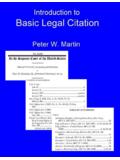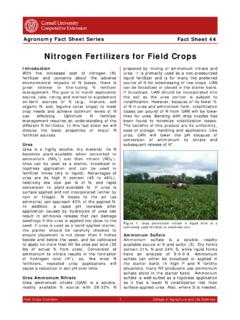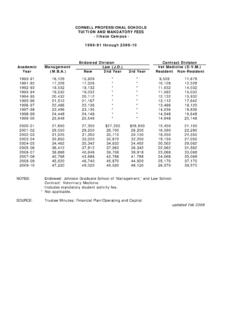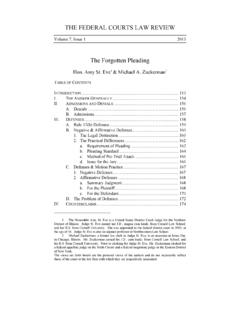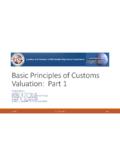Transcription of Alabama Debt Collection Laws - GRCA
1 Alabama debt Collection laws Submitted by Brent Yarborough, Zarzaur & Schwartz, Published by The national List of Attorneys Brent Yarborough is an attorney with the Birmingham law firm of Zarzaur & Schwartz, , where he practices in the areas of collections, creditors' rights, commercial litigation, and the defense of consumer law claims. He is a frequent speaker and author on topics related to collections and consumer law. Brent earned his degree, cum laude, from Birmingham-Southern College and his degree from Cornell University.
2 Brent serves on the Board of Directors of the National Association of Retail Collection Attorneys (NARCA), on the executive board of the Birmingham Bar Association's Bankruptcy and Commercial Law Section, and on the steering committee of the Central Alabama Financial Education Coalition. Zarzaur & Schwartz, is a full service creditors' rights law firm. Located in Birmingham, Alabama , the firm serves its many local and national clients throughout the State of Alabama , in all courts and jurisdictions. The firm specializes in the areas of commercial collections, consumer collections, medical collections, utility collections, student loan collections, collateral recovery, commercial bankruptcy, consumer bankruptcy, and the defense of consumer law claims.
3 Statute of Limitations & Judgments Collection suits are generally based on breach of contract or stated account, both of which fall under the six (6) year statute of limitations provided in Alabama Code Section 6-2-34. Actions for open or unliquidated account must be brought within three years. See Ala. Code 6-2-37(1) (1975). Judgments are presumed satisfied ten years after entry or last execution. See Ala. Code 6-9-191 (1975). A. judgment may be revived one time, but a judgment cannot be revived after the lapse of twenty years from its entry.
4 See Ala. Code 6-9-190 (1975). Judgments based on contract actions bear interest at the same rate of interest stated in the contract. All other judgments bear interest at the rate of percent per annum. See Ala. Code 8-8-10 (1975). Alabama has adopted the Uniform Enforcement of Foreign Judgments Act, which can be found at Ala. Code 6-9-230 et seq. Bad Checks A person commits the crime of negotiating a worthless negotiable instrument, if the person negotiates or delivers a negotiable instrument for a thing of value and with the intent, knowledge, or expectation that it will not be honored by the drawee.
5 Ala. Code This is a Class A misdemeanor. Most, if not all, district attorneys maintain a worthless check unit pursuant to Ala. Code 12-17-224 (1975). Alabama law also provides a private cause of action for bad checks. The holder of a worthless check may recover punitive damages, compensatory damages, and a reasonable attorney fee. Ala. Code 6- 5-285 (1975). Actions based upon a worthless check must be brought within one year. Ala. Code 6-5- 285 (1975). 1. Garnishment Exemptions The first 75% of a debtor's wages are exempt from garnishment.
6 See Ala. Code 5-19-15 (1975) and Ala. Code 6-10-7. Section 6-10-6 provides a $3, exemption for personal property, but this exemption specifically does not apply to wages, salaries, or other compensation. On the other hand, Section 204 of Article X of the Alabama Constitution (1901) allows a personal property exemption of $1, As a result, some debtors attempt to stack the exemptions found in Sections 5-19-15 and 6- 10-7 with the exemption found in Section 204 of the Alabama Constitution. That is, they use Sections 6- 10-7 or 5-19-15 to protect 75% of their wages and then claim that the Alabama Constitution protects an additional $1, that is left unprotected by those Code sections.
7 Thus far, the Alabama Court of Civil Appeals has not permitted the stacking of these exemptions. Roberts v. Carraway Methodist Medical Center, 591 870 ( 1991), established the test for claiming an exemption of wage garnishments: if the total value of all personal property of the debtor, plus the value of a paycheck, is more than $1,000, then the debtor cannot claim the exemption. See also Eight Mile Auto Sales, Inc. v. Fair, 25 459, 461 ( 2009) ( '[I]f [defendant's] declaration and claim of exemption includes any wages, the court will allow [defendant] to include wages and other personal property with a total aggregate value of $ , computed by including 100% of [defendant's] after tax wages for the pay period pursuant to 6-10-7.)
8 The homestead exemption is $5, , or $10, when the homestead is jointly owned by a husband and wife. Ala. Code 6-10-2 (1975). Licensing & Bonding With respect to debt collector licensing and bonding, Ala. Code 40-12-80 imposes a license tax on Collection agencies, depending on the size of the town in which the agency is physically located: 20,000. or more inhabitants - $100; towns and cities of fewer than 20,000 inhabitants - $25. The section defines a Collection agency as follows: [e]ach person who shall employ agents to solicit claims for Collection from persons, firms, or corporations in the state shall be deemed a Collection agency within the meaning of this section.
9 In an unpublished opinion, the United States District Court for the Northern District of Alabama held that the statute only applies to Collection agencies with a physical presence (offices, employees, or agents) in Alabama , thus an agency did not violate the FDCPA when it attempted to collect a debt from an Alabama consumer without paying the license tax. debt buyers are not subject to any additional licensing or bonding requirements. Also, there are no formal pleading or documentation rules applicable to debt buyers.
10 However, most courts will not enter a judgment without proof of the original debt and a complete chain of title, reflecting each and every assignment from the original issuer of the account to the current plaintiff. The original debt is generally proved through copies of the original contract, the account application, or account statements. 2. Assignments can often be proved with a bill of sale for each assignment, though a growing number of judges require proof that the debtor's specific account was part of the portfolio of accounts assigned.

